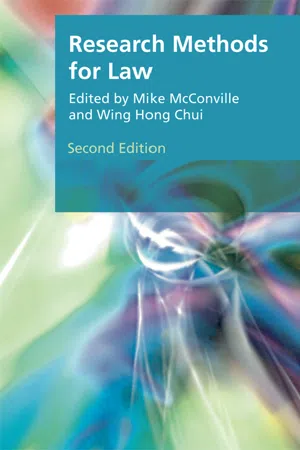
- 336 pages
- English
- PDF
- Available on iOS & Android
Research Methods for Law
About this book
Introduces students to legalistic, theoretical, empirical, comparative and cross-disciplinary research methods, grounded in working examples.
Drawing on actual research projects, Research Methods for Law discusses how legal research as process impacts on research as product. The author team has a broad range of teaching and research experience in law, criminal justice and socio-legal studies, and give examples from real-life research products to illustrate the theory.
New for this edition: a new chapter on inter- and cross-disciplinary research – essential reading for international students and students with a non-law first degree undertaking research in the areas of law, criminology, psychology and sociology; research ethics has been expanded to a full chapter that includes current plagiarism and imperfect disclosure; existing chapters have been brought up-to-date with the newest thinking in legal research.
Tools to learn more effectively

Saving Books

Keyword Search

Annotating Text

Listen to it instead
Information

Table of contents
- Title page
- Copyright
- Contents
- Tables and Figures
- Preface and Acknowledgements to Second Edition
- Preface and Acknowledgements to First Edition
- Introduction and Overview
- CHAPTER 1 Legal Research as Qualitative Research
- CHAPTER 2 Quantitative Legal Research
- CHAPTER 3 Doing Ethnographic Research: Lessons from a Case Study
- CHAPTER 4 Interdisciplinarity in Legal Research
- CHAPTER 5 Integrating Theory and Method in the Comparative Contextual Analysis of Trial Process
- CHAPTER 6 Comparative Legal Scholarship
- CHAPTER 7 Research Ethics and Integrity in Socio-legal Studies and Legal Research
- CHAPTER 8 Researching the Landless Movement in Brazil
- CHAPTER 9 Rejecting the Dominance of Empirical Legal Scholarship - A Better Way of Choosing, Researching and Writing a Scholarly Article
- CHAPTER 10 Researching International Law
- CHAPTER 11 Development of Empirical Techniques and Theory
- Notes on Contributors
- Index
Frequently asked questions
- Essential is ideal for learners and professionals who enjoy exploring a wide range of subjects. Access the Essential Library with 800,000+ trusted titles and best-sellers across business, personal growth, and the humanities. Includes unlimited reading time and Standard Read Aloud voice.
- Complete: Perfect for advanced learners and researchers needing full, unrestricted access. Unlock 1.4M+ books across hundreds of subjects, including academic and specialized titles. The Complete Plan also includes advanced features like Premium Read Aloud and Research Assistant.
Please note we cannot support devices running on iOS 13 and Android 7 or earlier. Learn more about using the app